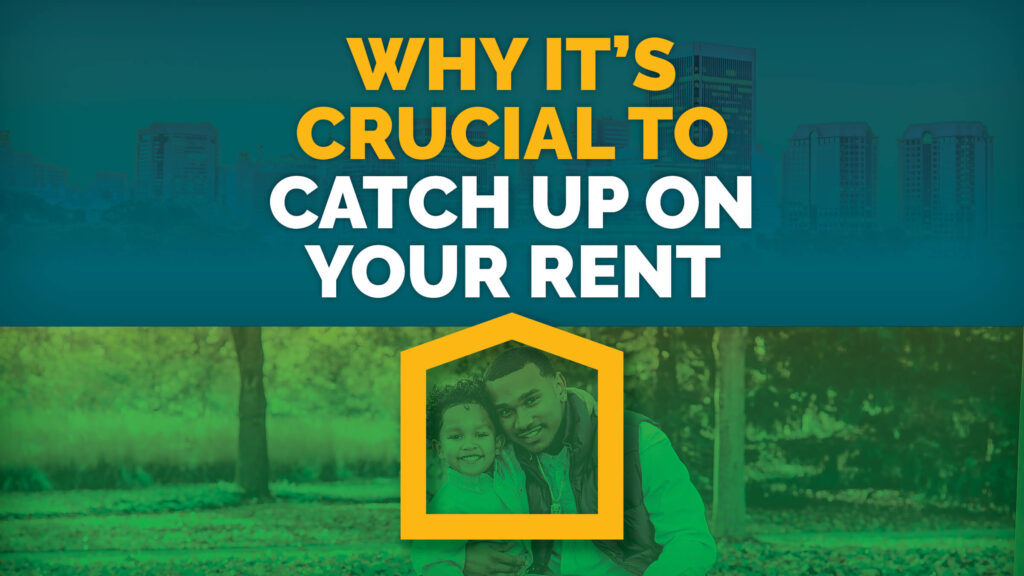Lease Enforcement Freeze
Update 4/19/24: RRHA will pause evictions for at least 30 days during a rent calculation quality check.
RRHA carefully manages its resources to achieve its mission of transforming the lives of families and communities in the belief that opportunity begins with living in a safe and affordable home. This can only happen if everyone does their fair share. While RRHA receives some funding from HUD and generous donations, we rely on timely rental payments to maintain and improve our communities.
Our Resident Service Coordinators and Property Managers work closely with residents to connect them with community resources to get them on a sustainable path to self-sufficiency. We want every resident to feel pride in doing their part to build a secure and well-maintained community with accessible resident services.
Over $3 million in rent is owed
~60% of households are behind on payments
As of April 2024
Paying Rent
Paying rent on time keeps a household in “good standing”. This is important for:
- Avoiding eviction from public housing
- Qualifying for a housing choice voucher
- Qualifying for the RRHA homeownership prgram
- Maintaining a positive credit score and rental history

Rent Responsibility
All RRHA public housing families have signed a Dwelling Lease stating:
- Rent payments are due on or before the 1st of each month.
- Any payment received after 5 PM on the 8th will be considered late. If the 8th falls on a weekend or holiday, then payment received after 5 PM on the next business day will be considered late.
- On the 9th of the month, if payment is not received, a five-dollar late fee will be assessed, and a notice of late rent and/or lease termination will be mailed.
Eviction Prevention Program
RRHA staff works diligently to minimize the number of lease enforcement actions by reaching out to residents who are behind in their rent through, e.g., email, text messages, letters, and even door-knocking. In these cases, we offer repayment agreements, services, and resources to help bring the resident’s account current and ensure they stay housed.
For those who are evicted, RRHA will partner with nonprofits to ensure they are placed into a shelter and not onto the streets.
You may be eligible for rent relief to help pay some or all of your balance.
For more information about available rental assistance funds:
- Visit https://home.treasury.gov/policy-issues and click on “Find rental assistance in your area”.
- Call 2-1-1 for assistance and additional information about rental assistance funds
- Contact your property management office to request the required documentation you may need to apply for the local rent relief
- Contact RRHA’s Call Center at 804-780-4200 for assistance
Repayment Agreements
All RRHA families behind on rent may sign a repayment agreement for every kind of tenant debt, including rent, utilities, late penalties, or other miscellaneous charges. A repayment agreement can give you a sustainable way to pay off your balance—while you stay in your home.
RRHA will never take a resident to court for debts that are addressed by a repayment agreement in good standing.
RENT
Up to 30% of income
REPAYMENT AMOUNT
Up to 10% of income
Do I have to make a down payment for a repayment agreement?
No. Down payments are not required.
Do I continue paying rent while I am repaying my back debt on a repayment agreement?
Yes. RRHA public housing families must pay their rent and other charges in addition to any amount owed under a repayment agreement.
Does the amount my household pays on a repayment agreement depend on our income?
Yes. Households will not pay more than ten percent (10%) of their monthly adjusted income toward the repayment agreement each month.
What if my household income changes?
If a household’s monthly adjusted income decreases during the repayment schedule, RRHA will decrease the monthly payment amount of the repayment agreement accordingly.
If a family’s income increases, RRHA will not increase the monthly payment amount of the repayment agreement.
What is the timeline for paying back my debt?
The timeline for a repayment agreement is based on the individual unit’s household income.
Repayment can take as long as each individual household needs to resolve the debt. As long as families make their monthly payments on time, they will be allowed to continue repaying their back debt until the debt is satisfied in full.
What happens if I miss a monthly payment under the new repayment agreement?
One missed monthly payment under the new repayment agreement will be added back to the tenant’s active ledger. The amount added back will only be the amount of that one missed payment. This will not impact the rest of the repayment balance.
What happens if I miss more than one monthly payment?
If two (2) or more consecutive payments of the repayment agreement are missed during any 12-month period, RRHA may terminate the repayment agreement and proceed with lease enforcement action.
If I have a repayment agreement, will my debt count against my eligibility for an RRHA housing program?
No. Any resident debt addressed by a repayment agreement in good standing will not count against the resident in any screening for eligibility to an RRHA housing program.
If I have a repayment agreement, can I still be admitted into RRHA’s Housing Choice Voucher program?
Yes. Residents with repayment agreements in good standing can be admitted into RRHA’s Housing Choice Voucher program.

Lease Enforcement Process
RRHA is federally mandated by the United States Department of Housing and Urban Development (HUD) to collect rent. If lease enforcement becomes necessary, the appropriate steps will be initiated.
- Late Rent Notice – RRHA will issue a 30-day lease termination notice to households that owe $50 or more or have defaulted on a repayment agreement. You have the right to examine RRHA documents directly relevant to this termination and to reply as you may wish to this termination notice.
- Summons for Unlawful Detainer – After 30 days, if the account has not been brought into good standing, RRHA issues an Unlawful Detainer. An Unlawful Detainer is a civil lawsuit filed against a tenant for violating the terms of a lease agreement that provides legal notice for the tenant to appear in court.
- Attending Court – Both parties will attend court after the unlawful detainer is filed against the tenant. The court date depends on the court’s schedule and availability, but it is generally 21 days after the Unlawful Detainer is issued.
- Court Judgement of Possession – If the resident appears in court, RRHA will most likely schedule possession 10 days after the court date. Possession entitles RRHA to recover possession of the housing unit from the household residents. The exact timeline for possession depends on the court’s schedule and any further requests from either party, RRHA or the unit’s residents.
- Notice to Vacate – The Sheriff will come to the household and serve the notice to vacate. After being served, the unit’s residents have a set number of days to remove their personal belongings and leave the property.
The leaseholder can pay the amount owed at any point during steps 1-4, and lease enforcement action will cease.
Full payment of all amounts you owe RRHA will cause the eviction to be canceled unless the court judgment included lease violations other than nonpayment of rent. Full payment includes:
- all rent as contracted for in your lease that you owe as of the day you make a payment
- any damages
- money judgment
- award of attorney fees
- court costs made at least 48 hours before the scheduled eviction
Any partial payment of rent made before or after a judgment of possession is ordered will not prevent RRHA from taking legal action to recover possession of your unit. If you make a partial payment after your lease terminates, then RRHA will accept that payment with reservation of rights pursuant to Section 55.1-1250 of the Code of Virginia, 1950, as amended. Accepting any partial payment of rent, damages, and other fees, or any future payments of rent does not waive RRHA’s right to take legal action against you for nonpayment.
Resident Rights and Protections
It’s very important to know that all residents have protections under the lease agreement.
If a resident feels that an RRHA action—or failure to act—has adversely affected their rights, duties, welfare, or status, the resident can initiate the Tenant Grievance Procedure.
The Tenant Grievance Procedure can apply to any dispute, including rent disputes, or those involving any of the lease’s rules or regulations. You have the right to request a grievance hearing within 10 business days of a lease enforcement notice.
A packet about the procedure is available at any property management office.